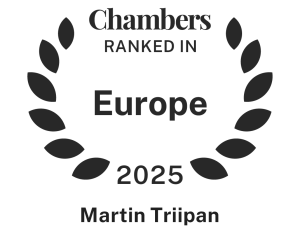Martin Triipan is a partner with wide experience almost exclusively in environmental and planning law and is, therefore, one of the very few truly specialised lawyers in these fields in Estonia. With over 20 years of practical experience, he advises clients on complex environmental liability questions, often supporting the other practice areas of the firm in property transactions. He is also recognised as one of the most experienced litigators in the field.
In addition, Martin is active in legislative drafting — he has participated in the codification of the Estonian Environmental Law and has written on various environmental law-related issues in a number of local and international publications.
Martin Triipan was awarded the title Lawyer of the Year at the Estonian Bar Association’s 100th anniversary ceremony in 2019.
He also contributes to the development of the Estonian Bar Association as a member of the board for the period 2025-2028.
Martin Triipan is highly regarded for his expertise in public law matters connected to real estate and construction mandates. He is knowledgeable in planning and permitting issues as well as environmental impact assessments, and has experience acting for state entities and energy companies. “He is a very experienced real estate lawyer who is good in environmental, planning and permit matters,” a client says.
Initial public offering of Enefit Green shares
Institutional infrastructure investors to acquire Adven
Advising Vopak E.O.S. AS on planning
2005
University of Tartu, Estonia
2001
University of Tartu, Estonia
2025
Estonian Bar Association
2020
Estonian Bar Association
2002
Estonian Bar Association
2001-2002
Estonian Moot Court Society
2001
Estonian Academic Law Society
2001
Estonian Moot Court Society
2022
Inimõigused (Human Rights)2019
Juridica: "How Long Should Waste be Tracked? By-products and End-of-waste Status"2017
Yearbook of Estonian courts 2016
2015
Comments to General Part of Environmental Code Act (2015)
2014
Estonian Environmental Law Center
2008
The International Comparative Legal Guide to: Environment Law 2008. UK Global Legal Group Ltd. (Estonian chapter)
2007
The International Comparative Legal Guide to: Environment Law 2007. UK: Global Legal Group Ltd. (Estonian chapter)
2006
The Principle of Proportionality in European Union Law. Juridica, 3, 151–158
2001
The Principle of Proportionality in the Constitutional and Administrative Law. Juridica, 5, 305–313 (in Estonian)
Linked Services
- ESG services
- Real Estate Transactions & Leases
- Commercial Transactions
- Construction
- Corporate Crimes and Investigations
- Constitutional and Administrative Proceedings
- Construction and Real Estate Disputes
- Energy Disputes
- Tax Disputes
- Energy & Infrastructure
- Environment
- General Commercial & Compliance
- Planning & Zoning, Land Use
Linked Industries





